|
|
| Line 151: |
Line 151: |
| * Inos 42 was utilized as a burial site by the Sith Lord Urias Orian | | * Inos 42 was utilized as a burial site by the Sith Lord Urias Orian |
|
| |
|
| == Trivia ==
| | |
| * Originally the system of Orian was a binary system with two stars, however, its given design would not have be possible and the system would have destroyed itself; as such, Ombus was developed to keep everything already established with limited changes
| |
| * The Orian system was initially conceived as the home system for [[Naga Sadow|Clan Naga Sadow]] following the [[Exodus]] by [[Trevarus Caerick]], its history with [[Urias Orian]] and [[Okemi]] were initially designed to tie the system into existing [[Dark Brotherhood|Brotherhood]] Lore
| |
| <br /> | | <br /> |
| {{Naga Sadow}} | | {{Naga Sadow}} |
| [[Category:Star Systems]] | | [[Category:Star Systems]] |
| [[Category:Naga Sadow territories]] | | [[Category:Naga Sadow territories]] |

|
This map's not complete. It's just a piece. This page is flagged for further work under the Clan Naga Sadow article improvement drive.
Expected changes include: fact-checking and updates
After improvement is complete, please place a note on the article's talk page and remove this message.
|
The Orian System is located in Orian Space, a region on the outskirts of Sith Space in the Outer Rim. Orian Space stretches from the Orian system to the Hydian Way and is patrolled by the Dlarit Navy to ensure clear passage between the two. The Orian System itself is comprised the star of Orian and its planetary system of six planets, as well as a number of dwarf planets, satellites (moons), and other objects that orbit Orian. It is located on the outskirts of Sith Space and accessible through the Orian Pipeline along the Listehol Run junction from the Hydian Way. While considered on the outskirts of Sith Space, Orian still lies firmly within the Stygian Caldera and thus remains a difficult system to get to without knowing the pathway and possessing the proper data within a navcomputer. Orian itself is a traditional solar system defined by a primary star with an inner and outer region divided by an asteroid belt. The primary star named Orian is a red giant suspected to be midway through its lifespan. A notable body within the system is the planet Ombus, once mistakingly referred to as Orian Minor because of the sheer luminosity of the planet as well as the low heat fusion that the planet generates. This luminosity is known to cause severe distortions concerning a traditional cycle between day and night on many planets within the system, something considered deeply irritating and erratic by many of the sentient lifeforms visiting or inhabiting Orian.
Historically, the Orian system was home to the rouge Sith Lord Urias Orian who discovered the system over five millennia ago through a direct hyperspace pipeline along what is now known as the Listehol Run. Many of the ruins and artefacts located within the Orian system reflect the culture and architecture of the Ancient Sith Empire, although Lord Orian ensured the location of his little Empire remained a secret from his rival Lords. It is rumoured that centuries later the followers of another renegade Sith Lord named Okemi used the Orian system as part of a passageway between the Ancient Sith empire and his cult known as the Star Chamber located on Antei within the Antei system.
During the years winding down the Galactic Civil War and what followed, the Dlarit Corporation assumed control of the Orian system becoming the public authority governing the denizens who arrived with them and those who would follow. This organization was simply a cover for the Disciples of Sadow amongst the Dark Brotherhood who sought to rule Orian from the shadows. Before the fall of the Dlarit Corporation, they maintained the security and safety of the system through use of the Dlarit Security Force and subsequently the Dlarit Special Operations Group. In recent time, control of the system seems to be marked by a fleet known as the Warhost governed by a body of shadowy individuals operating as a sort of Syndicate.
Stellar Body: Orian
- Main article: Orian Major
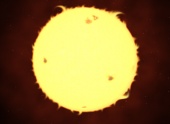
The red giant known as Orian is the primary star serving as the anchor and center of mass to its solar system. While red giants are not uncommon stars to be seen hosting habitable planets, the fact that this particular star has seemed to have such a long lifespan is unusual as much of the scientific community still believes it has a few million years left ahead of it. Like most stars of this class, Orian burns incredibly hot making the planets nearest to it uninhabitable and even incredibly difficult to approach without the appropriate shielding and protective measures. Given the rather unusual structure and composition of the Orian system, many Brotherhood scholars believe that Orian's longer than usual lifespan and its fusion reactions may have been altered in some way through some form of ancient Sith ritual cast by Urias Orian himself, though there are no recorded documents or local legends which can provide any such evidence of such.
Notable Details:
- Mean Diameter: 3,600,000km
Inner Solar System
Orbit One: Mukuru, Nuvenpa & Ulatyu
- Main article: Mukuru
- Main article: Nuvenpa
- Main article: Ulatyu
The first orbital pattern within the Orian system is held by a trio of dwarf planets known as the Sisters of Orian. While in years gone by it was believed that only two of these entities could be defined as planets, it has recently been discovered that all three planets orbit a single center of mass and do not in actuality orbit each other. Due to their proximity to Orian, this trio of dwarves are all highly uninhabitable although Ulatyu has been previously considered for an outpost. All three of these planets are consistently being barraged by solar winds and due to their volcanic nature seem to be almost constantly undergoing changes to their terrain, subsequently making it impossible to give any points of interest or waypoints for someone to use without the assistance of a guidance system.
Notable Details:
Orbit Two: Aeotheran & Amphor
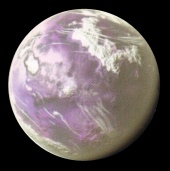
- Main article: Aeotheran
- Main article: Amphor
The gas giant of Amphor has long been a focus within the Orian system either by the ancient Sith Empire for the use and collection of its Tibanna Gas for use in their fleets, or a target in the sights of the Dlarit Corporation before its upheaval. While no more notable than any other Gas Giant, Amphor has managed to maintain a rather bustling little community of miners across its many moons and on its main "cloud city" of San Korinar. Before the Dlarit Corporation lost its hold on the system, the city of San Korinar was one of many that had been a target of major revitalization to support the influx of refugees from the Yuuzhan Vong War as well as to repair any damages that the city had incurred during the many riots and attempted attacks on the Corporation's controversial Special Operations Group.
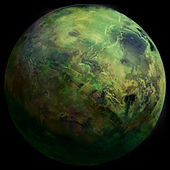
Trapped as a satellite of Amphor is the planet Aeotheran, a temperate jungle world marked with large mountain ranges and oceans. While Amphor has many moons that orbit its body, Aeotheran itself lies in a separate orbital pattern outlying the traditional moons of Amphor. When the Dlarit Corporation assumed control of the Orian system, Aeotheran was a prime target for many of their mining operations and the prefabricated city of Seng Karash was established for its many workers. Outside of Dlarit involvement, Aeotheran also possesses many temples, ruins and relics from Orian's empire dotted across its surface as well as a powerful Force nexus with the Nifokalija mountains. In 34 ABY, a development effort spearheaded by the Corporation saw the construction of Kel Rasha and The Gilded Archipelago in an effort to attract more consumers and wealthy denizens to Orian similar to the efforts seen with the construction of the Lor Zatean and Pandaemonium resorts. In the years that followed, Aeotheran has seen many expansion efforts by its own local population as the Dlarit Corporation lost its grip on the system and subsequently fell apart.
Amphor Notable Details:
Aeotheran Notable Details:
Orbit Three: Gamuslag & Sepros
- Main article: Gamuslag
- Main article: Sepros
The fourth orbital pattern within the Orian system is comprised of Gamuslag and Sepros. Similarly to the Sisters of Orian, Gamuslag was once considered a satellite to Sepros until the discovery that the two entities share a center of mass. Due to the two planets close proximity, the satellites Sepros Major and Sepros Minor are consistently being monitored by members of the scientific community to ensure they don't break their orbital holding from Sepros. Gamuslag has long been a wasteland, often used for extreme military training and as a dumping ground by many of the smaller corporations within the system for their hazardous waste. Sepros meanwhile is a jungle world which is dotted with temples from Urias Orian's empire as well as a large crater from the destruction of the VSDII Ballista crashing into the planet.
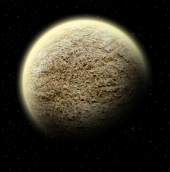
Gamuslag Notable Details:
- Mean Diameter: 6,428km
- Barren wasteland
- Often used as a dump site for hazardous waste
- Points of Interest: Cenota Facility
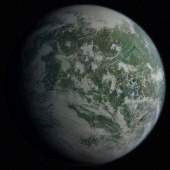
Sepros Notable Details:
Orbit Four: The Dentavii Asteroid Belt
- Main article: Dentavii asteroid belt
Having once been the world of Dentavii, the Dentavii belt is a collection of shards and fragments remaining from the Sith Lord Urias Orian's wrath upon the planet. The millennia which followed allowed these fragments to disperse into a proper belt around the system, although some suspect that it was Orian himself who instigated this change. Since their occupation of the Orian System, the Disciples of Sadow constructed the Dentavii Prime Facility on the largest fragment within the belt. Originally this was constructed to house the members of House Ludo Kressh before the completion of the Marakith Skyhook, later this facility was re-purposed as the primary refuel and refit station for the Dlarit Special Operations Group; it has since fallen out of favour and largely fallen into disrepair.
Notable Details:
- Former world of Dentavii destroyed by the Sith Lord Urias Orian
- Dentavii Prime, "Asteroid" with Mean Diameter: 974km
- Numerous other bodies located across the system, suspected mining operations upon many of them
Outer Solar System
Orbit Five: Ombus
- Main article: Ombus
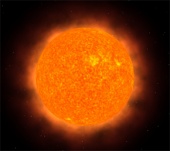
Originally perceived as a star because of its sheer luminosity, these entity had been called Orian Minor for years before the discovery that it was in truth a world comprised almost entirely of crystal. With towering crystalline spires of orange and even a matching surface reminiscent of glass, this world seems to absorb, reflect and refract the light it receives from the star of Orian. Scientists and scholars within the community of Naga Sadow decided upon the name of Ombus for the body in reference to the ancient "Star of Ombus" told in the legends of Urias Orian, deciding it was a fitting title. Krath scholars from across the Brotherhood have come in recent times to research this strange world, requiring heat resistant EVA suits, breathing equipment and largely utilizing scanners to determine the composition of the planet as it possesses no atmosphere and the surface temperature is far too high for most galactic denizens. In recent studies, both the surface and the crystalline spires seem to be far too dense for even the most sophisticated cutting tools to pierce. When energy based tools such as cutting lasers, or simply blasters, are used, there appears to be no affect as the target either absorbs, refracts, or simply allows the energy burst to pass through ineffectively.
Notable Details:
- Mean Diameter: 87,000km
- Zero Atmosphere
- Seemingly molten core, low heat fusion
- Crystalline Surface and Spires, seemingly impenetrable
Orbit Six: Tarthos
- Main article: Tarthos
Of the planets of Orian, Tarthos is one of the most established alongside Aeotheran and the cloud city San Korinar. Like most of the planets of Orian, it is also a harsh and unforgiving world covered largely in snow and ice. Given its distance from the core and the lack of heat generated by the planet Ombus, Tarthos is almost similar to the more famous worlds of Hoth and Ilum in terms of its environment and weather patterns. This harsh environment is typically negated by environmental generators around the cities of Kar Alabrek and Markosian City or even the monastery of Mucenic, however they do little to reduce the chill of the planet's temperatures, often only being able to bring the temperatures to a more comfortable ten degrees Celsius on a warmer day. Historically, Tarthos maintained a more militaristic focus for the Disciples of Sadow, specifically with the platform Onyx operating as refuel and refit for their navy. Since the fall of the Dlarit Corporation, however, the planet has largely grown into its own with the booming metropolis of Kar Alabrek operating as a major trade hub while the city of Markosian having largely fallen into disrepair following the riots of 35 ABY.
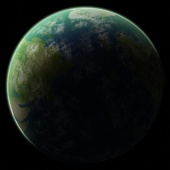
Notable Details:
Orbit Seven: Inos
- Main article: Inos
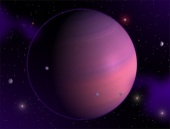
The gas giant of Inos is the last identified planetary body within the Orian system and is largely surrounded by many satellites and dwarf planets of which few have been fully explored or identified. While Inos is abundant in resources which could be mined, most of these are considerably difficult to refine or mine and are significantly easier to obtain from Amphor. The mixture of the Methane, Hydrogen, Ammonia, Nitrogen and other trace organic gasses are assumed to be what give Inos its distinctive purple hue, although the pressure exerted within the giant's atmosphere make it nearly impossible to determine further. Probes sent by members of the scientific community have experienced a variety of turbulent conditions from magnetic flux to hyper-cyclonic storms, all of which make determining the precise composition of Inos nearly impossible; though many within the community believe the planet's core to be comprised of a metallic hydrogen compound in a state of flux. Since Inos itself is largely unstable and it is nearly impossible to survive within atmosphere, the Disciples of Sadow have largely taken to utilizing the many moons and dwarf planets of Inos which are largely uninteresting balls of snow and rock with limited atmosphere.
Notable Details: